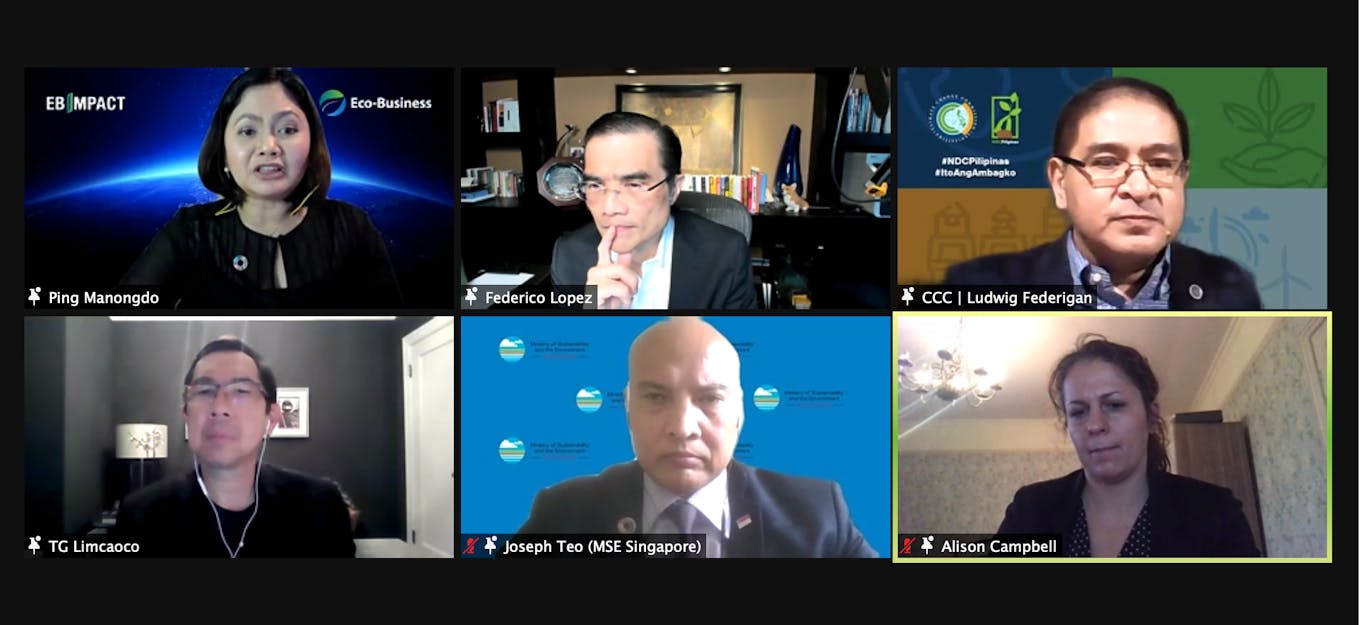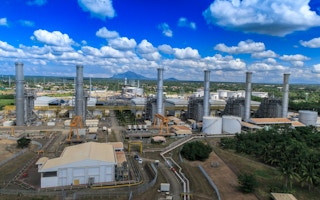As the Covid-19 outbreak revealed the resilience of renewable energy markets to the crisis, two of the Philippines’ oldest and largest conglomerates have stepped up moves towards carbon neutrality in the post-pandemic recovery.
To continue reading, subscribe to Eco‑Business.
There's something for everyone. We offer a range of subscription plans.
- Access our stories and receive our Insights Weekly newsletter with the free EB Member plan.
- Unlock unlimited access to our content and archive with EB Circle.
- Publish your content with EB Premium.
For instance, the telecommunications arm of Ayala Corporation added four more offices operating on clean energy using carbon offsets from wind power, soon after lockdown restrictions were lifted last year. Power generation firm First Gen of the Lopez Group pledged last month to develop a US$125 million hydropower project to boost its green energy portfolio.
But are these commitments enough for the country’s corporate sustainability leaders to inspire other local businesses to transition to clean energy in the post-Covid era?
“
You need to balance the economic realities versus what the ambition is. [Our clean energy transition] might be slow but we will get there. We cannot transition overnight because that would cause economic dislocation.
TG Limcaoco, chief financial officer and chief sustainability officer, Ayala Corp
A virtual forum hosted by Eco-Business and the British Embassy in Manila on Thursday (27 January) titled Leaders or laggards? Corporate leadership in low-carbon post-pandemic recovery, shone a spotlight on two of the country’s corporate giants on how they plan to decarbonise, even as they admit to being unable to scrap their fossil fuel investments.
“I think people have to understand the trade off,” said TG Limcaoco, Ayala Corp’s chief financial officer and chief sustainability officer.
“You need to balance the economic realities versus what the ambition is. [Our clean energy transition] might be slow but we will get there. We cannot transition overnight because that would cause economic dislocation.”
With more than half of the country’s energy mix under the government’s energy plan coming from “traditional sources”, Limcaoco said there must be a balance between following policy and the energy needs of the country and “withdrawing all sorts of [fossil fuel power] facilities, which might cause electricity prices to rise.”
Limcaoco, who is also the incoming head of Ayala-led Bank of the Philippine Islands, said that the bank’s loan book is split evenly between thermal and renewable investments, but the goal is to pump in more clean energy projects to “much higher than half.”
BPI has been the biggest coal funder among local financial instiutions, channelling more than US$3 million in loans and underwriting to coal-fired plants from 2009 to 2019, according to a 2020 study by Germany-based non-profit Urgewald. However, Ayala Corp’s power generation subsidiary, AC Energy, pledged last year to exit coal, but this will not be happening until 2030.
“
You can’t tell people to cut their electricity consumption or reduce their aircon use. I wish we could, but you’d have a revolt.
Federico Lopez, chief executive officer, First Gen
First Gen chief executive officer Federico Lopez said although it would be “ideal” to cut out fossil fuels out of the country’s post-Covid energy picture it was not a realistic ambition, because of the intermittency of solar and wind energy.
He cited natural gas, a fossil fuel that emits up to 63 per cent less carbon dioxide than coal, as a reliable transition fuel to complement renewables.
First Gen is the only one of the country’s biggest power firms with no existing or proposed coal projects after it announced its exit from coal in 2016, but it currently has four operational natural gas-fired power plants, with an additional terminal to be constructed this quarter.
He pointed to battery storage as another solution to intermittency, as global prices have plummeted. But he said the amount of batteries needed during a power outage is so large that it would trigger an increase in energy capacity, which would drive up electricity prices.
“You can’t tell people to cut their electricity consumption or reduce their aircon use. I wish we could, but you’d have a revolt. Similarly, if we use renewables along with batteries, electricity would be so expensive that there’d be an outcry,” said Lopez.

‘Leaders or laggards? Corporate leadership in low-carbon post-pandemic recovery’ virtual forum. From top left: Eco-Business’ Ping Manongdo, First Gen’s Federico Lopez, Philippine Climate Change Commission’s Ludwig Federigan, Ayala Corp’s TG Limcaoco, Singapore’s chief negotiator for climate change Joseph Teo, and United Kingdom’s deputy COP26 envoy Alison Campbell. Image: Eco-Business
Philippines’ decarbonisation plan: Not just dependent on corporates, but on foreign aid, too
At the same forum, an official from the commission that represents the Philippines at the United Nations (UN) Framework Convention on Climate Change’s annual conference of parties (COP) said the Philippines’ decarbonisation efforts also relied on support from richer nations.
Ludwig Federigan, who heads the information and knowledge management division of the Climate Change Commission, told the panel: “The Philippines as a developing country is not awash with financial resources. The Paris Agreement provides a framework of support to poorer nations, and our country needs all the help it can get in terms of technology transfer, commitment to investments, and financing adaptation strategies from the developed nations.”
In a presentation to civil society organisations in December, the commission said that the nation was aiming to reduce harmful greenhouse gases by 30 per cent by 2040. Of this percentage, a 20 per cent reduction would be conditional on foreign aid, while 2 per cent would be an “unconditional” reduction.
This was a retreat from its original pledge in 2015 of cutting emissions by 70 per cent compared to business-as-usual levels.
The announcement was met by harsh criticism from civil society groups, forcing the body to delay its submission of its updated targets, known as nationally determined contributions, which was supposed to have been sent to the UN by the end of 2020.
Alison Campbell, deputy director of COP26, said in the webinar that there was a “need for ambitious targets” among countries to be able to meet the Paris Agreement’s goal to cap global warming at 1.5 degrees Celsius.
“We really hope that the Philippines, given all the vision it shared in the past, will be able to be a prominent voice ahead of COP26, in meeting the energy targets,” Campbell said.










